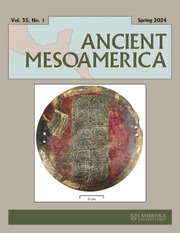Article contents
CHILD SACRIFICE IN TULA: A BIOARCHAEOLOGICAL STUDY
Published online by Cambridge University Press: 07 May 2021
Abstract
Recent salvage excavations conducted in the Early Postclassic city of Tula, Hidalgo, exposed a residential compound containing an open patio, beneath which was discovered a massive burial, designated Feature 5. Human remains involving a minimum of 49 individuals were discovered, many of whom were arranged in a sitting or squatting position. The majority of individuals, including all of the latter, were young children. The bioarchaeological analysis suggests that they were sacrificed. Many individuals exhibited anthropogenic modification, including cut marks on the skull and postcranial skeleton, indicating the children had been flayed. Some individuals were represented only by the skull and cervical vertebrae, suggesting decapitation. The individuals appeared to be in bad health, a common attribute of children sacrificed to Tlaloc by the Aztecs. According to ethnohistorical sources, children offered to Tlaloc commonly had their throats slit, although this practice was not identified among the individuals in Feature 5, possibly owing to their young age. Sacrifice also may have been made to Xipe Totec, as suggested by the evidence of flaying and the presence of a large hollow sculpture of the deity located in an adjacent residential compound, a deity who has been also linked to human sacrifice related to regeneration and fertility.
- Type
- Special Section: Tula in the Twenty-First Century: New Data, New Perspectives, New Insights
- Information
- Copyright
- Copyright © The Author(s), 2021. Published by Cambridge University Press
References
REFERENCES
- 7
- Cited by



